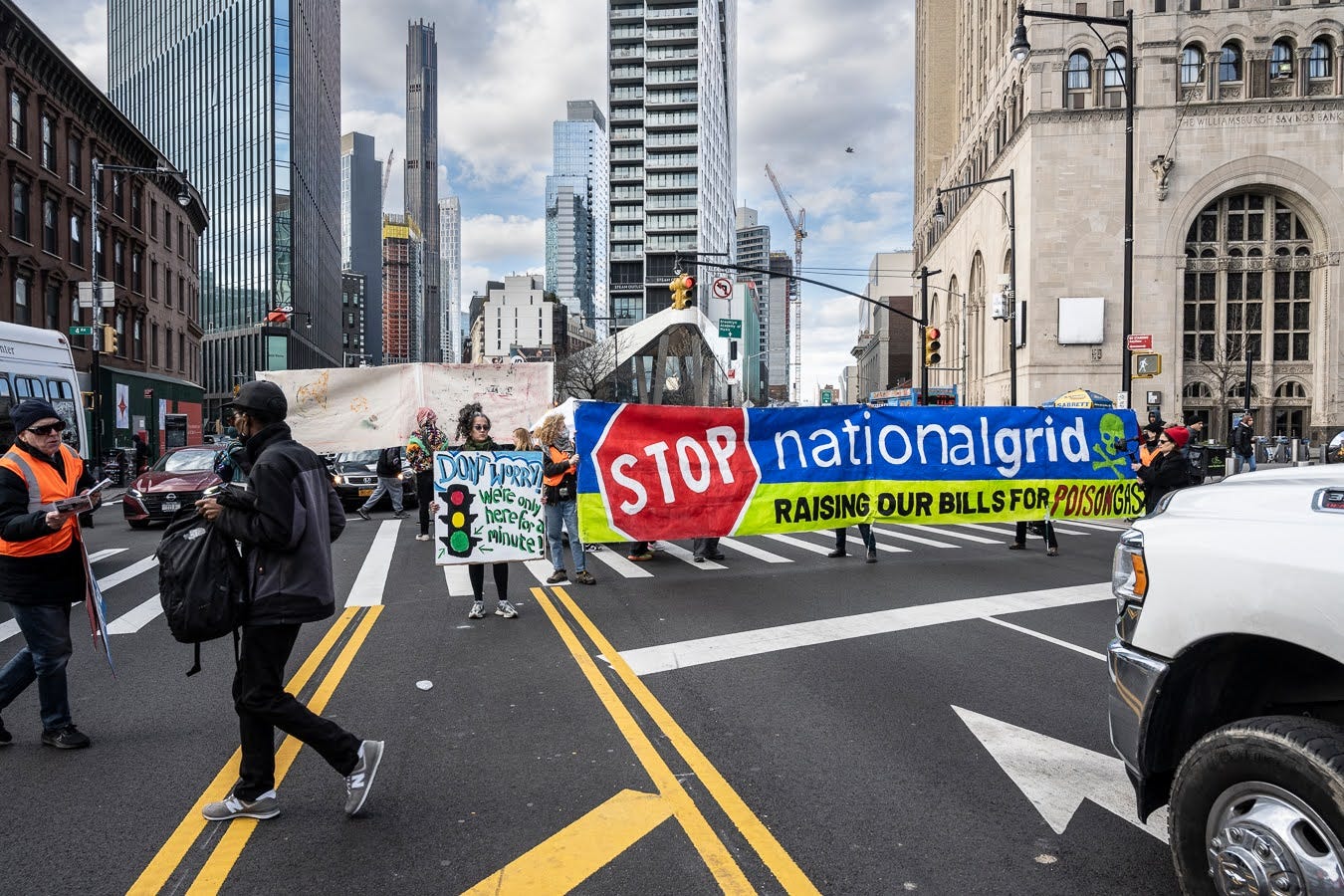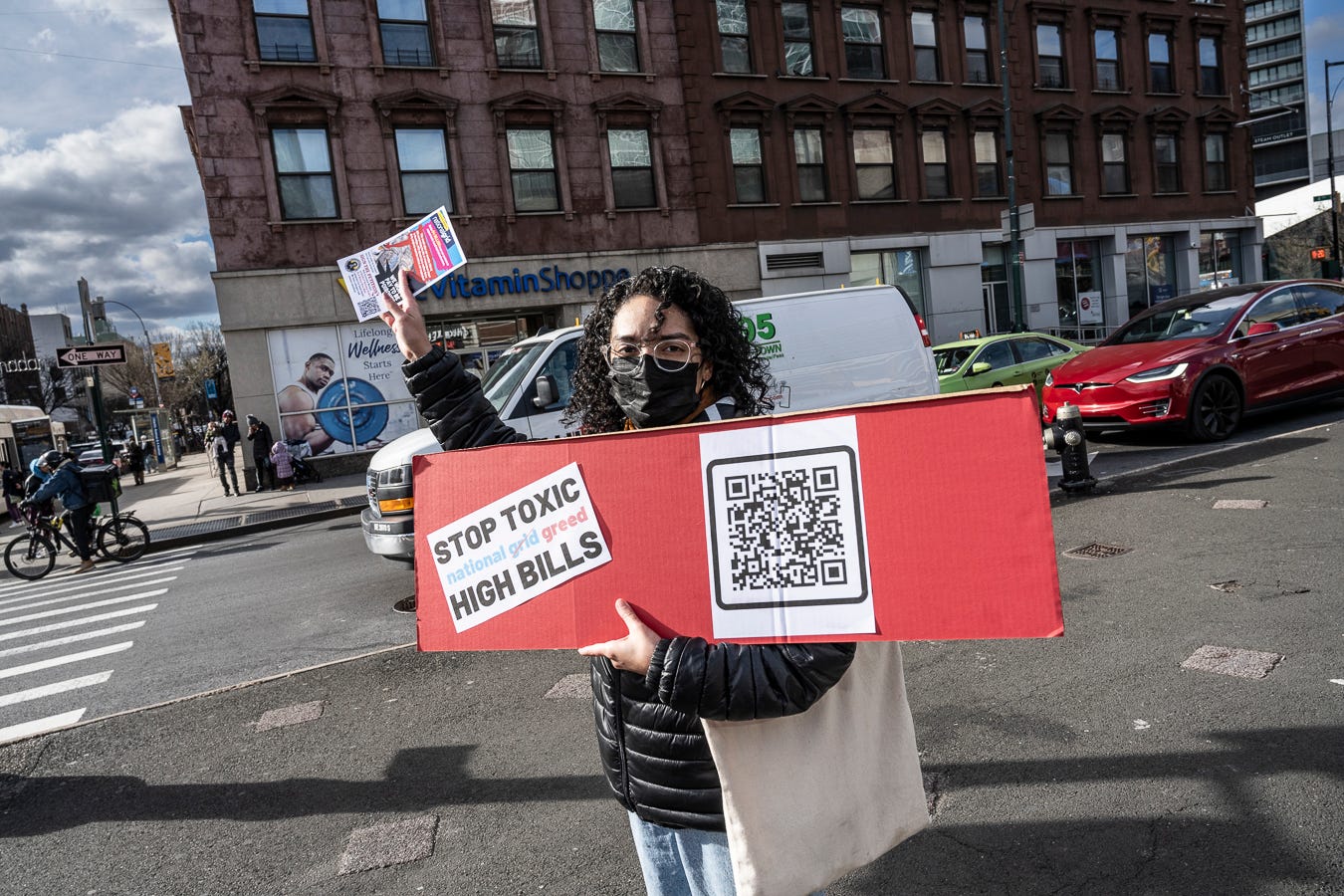Activists Take Stand Against National Grid's Rate Hikes and New York State Leaders’ Climate Inaction
LNG Gas Expansion Push Sparks Outcry, Ignites Calls for NY HEAT Act
3/18/2024 Brooklyn, NY - Members of Sane Energy and the No North Brooklyn Pipeline Alliance displayed a message to their neighbors during afternoon rush hour traffic yesterday at the famed Atlantic-Flatbush intersection adjacent to National Grid’s New York headquarters near Barclays Center.
The action aimed to draw the public’s attention to National Grid's unprecedented proposed $3.8 billion price hike, which would burden New Yorkers with significant increases in their monthly bills. This would exacerbate financial strain on households across Brooklyn, Queens, Staten Island, and Long Island and further lock New Yorkers into paying National Grid for soon-to-be-obsolete infrastructure known as ‘stranded assets.’
The proposed bill hike would burden consumers with an average increase of $33.84 per month (+28.82%) for National Grid Customers in Brooklyn, Queens, and Staten Island and $34.79 per month (+30.69%) for Long Island customers. Such a financial burden would disproportionately affect vulnerable communities and exacerbate socio-economic disparities.
New York’s climate law commits the state to reducing greenhouse gas emissions by 40 percent by 2030, just six years away, and no less than 85 percent by 2050. National Grid’s proposal is in direct conflict with the state’s mandates. National Grid is currently asking to continue investing in their gas system across thousands of miles, claiming their pipelines are “leak-prone.” They are also seeking massive investments in their 120-acre liquefied natural gas (LNG) facility in Greenpoint, which sits atop the Newtown Creek Superfund site, one of the nation’s most highly contaminated sites mandated for remediation by the U.S. Environmental Protection Agency (EPA), and adjacent to Cooper Park Houses, a New York City Housing Authority residence.
The activists are challenging the need for this colossal rate increase, which will impact struggling New Yorkers, to pay for nearly $ 4 billion of methane infrastructure by the U.K.-based corporation.
In 2019, New York State denied several fracked gas projects in Brooklyn and pointed to National Grid’s faulty assessment data. Community activism compelled the state to halt the Williams Pipeline, even as National Grid lobbied hard for it. Most recently, in 2023, a 4-year campaign led by the No North Brooklyn Pipeline Alliance led to an independent assessment of the need for liquefied natural gas (LNG) vaporizers at the apex of the controversial North Brooklyn fracked gas pipeline. The assessment required the company to update its forecasted gas demand and found a reduction in projected peak demand, leading the state regulators at the Public Service Commission to deem the project unnecessary. Public Service Commission Chair Rory Christian stated: “...now is the time for National Grid to redouble its efforts at energy efficiency and other demand-side management programs to delay further or entirely avoid the need for the project.”
Activists now demand the development of a clear plan for the retirement of National Grid’s toxic LNG facility in Greenpoint by 2030. Expert analysis in the current rate case again calls into question National Grid’s projections for need. But, eliminating the gas infrastructure will require a transition to beneficial electrification and a sharp increase in renewable energy generation and energy efficiency upgrades. The most promising technologies are district geothermal systems and thermal energy networks, which use a combination of water-filled pipes and heat pumps to provide affordable, clean, and healthy heating, cooling, and hot water to buildings at neighborhood scale while reducing the burden on the electric grid. Implementing TENs in disadvantaged communities will protect them from being stuck with rising gas prices as wealthier communities electrify, leaving those still on gas with an ever-growing share of the cost of operations and maintenance of the obsolete gas system.
In light of these concerns, activists urge Governor Hochul and the Public Service Commission to reject National Grid's proposed rate hikes and for Governor Hochul and Assembly Speaker Carl Heastie to prioritize investments in the clean energy solutions of the NY HEAT Act, which are aligned with the state's mandated emission reduction goals.




